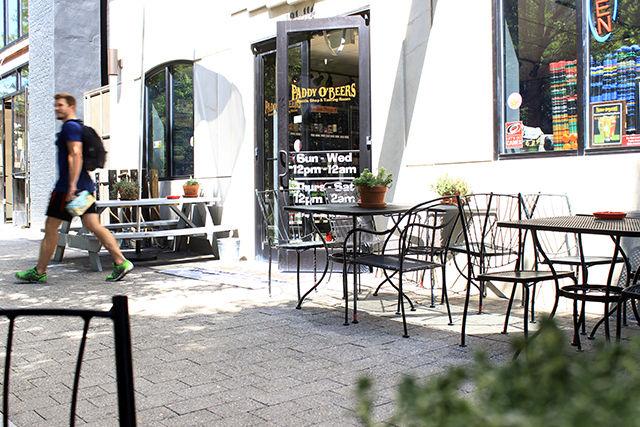Raleigh’s public safety committee implemented new restrictions regarding how late restaurants and bars can serve patrons on sidewalk patios during their meeting on July 28.
The committee, lead by City Council members Mary-Ann Baldwin, Wayne Mariorano and John Odom, opened the floor to comments and concerns about the controversial issue that has been haunting business owners since late May.
“I have a three-month old son at home,” said Zack Medford, owner of Paddy O’Beers downtown. “I would rather be worrying about him than Paddy’s”.
In the past, restaurants and bars that utilize public sidewalks for seating had the option of keeping these areas open until 2:30 a.m. With the new ordinance, businesses will be required to shut-down these areas at midnight Sunday through Thursday and at 1 a.m. Fridays and Saturdays.
The ordinance also calls for increased communication between affected business owners and the city of Raleigh.
These restrictions will stay in place for a six month trial period. The council will look at extending, dropping or changing the restrictions in January of next year.
Earlier this summer, the city attorney’s office encouraged the adoption of new rules governing sidewalk use because residents of Fayetteville St. and Glenwood Ave. had began complaining of excessive noise and trash.
City officials said that they have received around 30 complaints since the beginning of June regarding crowded sidewalks, trash and late-night noise downtown.
“Most adults try to go to sleep by 10, maybe 11 at the latest,” said Dr. Jon Kolkin, a local physician and downtown resident.
Kolkin also said he holds concerns about the increased probability of obesity, cancer and diabetes that is associated with his loss of sleep due to the noise pollution coming from downtown.
A number of attendees wearing blue to show support for late-night sidewalk use flooded the council meeting, filling the room with hushed chatter.
Jess Cronmiller who works as a waitress downtown, said that she, along with the majority of her co-workers and food industry counterparts make the most money between the hours of 10 p.m. and 2 a.m.
“People who don’t make money, can’t spend money,” Cronmiller said. “That is less money made by businesses, less in taxes and less to vendors”.
After polling a number of residents downtown, Jim Belt, co-founder of Downtown Living Advocates said that he found “most [residents] do not believe in closing down the bars that early.”
Belt also said that bothersome noise pollution can be dealt with with a simple bedroom fan, which he believes a number of Raleigh residents probably already own.
“Living in the Hillsborough neighborhood, and owning and operating businesses in downtown as well as all over Raleigh, I have always loved the vibrancy and vitality of this town,” said Niall Hanley, owner of seven hospitality based establishments in the Raleigh area. “That hour of business that will be taken away is vital to many small businesses who have taken Raleigh onto their backs and built that vitality that people want in a city”.
Medford agreed that reducing the hours that businesses are allowed to use public sidewalks as patio space will have a detrimental effect.
“People love Raleigh, they love to sit outside underneath our oak trees, look up at the capitol and drink a local beer that was brewed right here in Raleigh. That is the culture that we are working with here,” Medford said.








